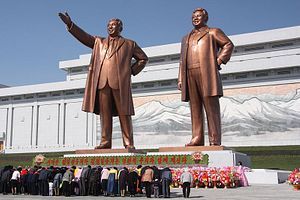For the first time in almost six years, representatives of the North Korean government may meet former U.S. officials in the United States. Preparations for the New York City meeting were first reported by the Washington Post, which added that it signals that “Pyongyang sees a potential opening with the Trump administration.” The Wall Street Journal reported last year that the United States and North Korea had explored formal talks in late 2015, before North Korea’s fourth nuclear test in January 2016 ended any momentum there. The last time U.S.-North Korea talks took place publicly in New York was July 2011, but a 2013 meeting between the Obama administration’s former special envoy and North Korea’s UN Permanent Representative Han Song-ryol was reported to have taken place in March 2013.
The talks under consideration reported by WaPo would take place at what’s known as the Track 1.5 level — with one side sending formal governmental representatives and the other side, the United States in this case, sending former officials and potentially subject area experts. Before the attempt at talks in 2015, the United States held that talks with North Korea would only be possible after Pyongyang took a first step to suggest it was interested in denuclearization. After two nuclear tests and 24 ballistic missile launches in 2016 — the busiest year for North Korea’s parallel nuclear weapons and ballistic missile testing programs to date — hope that Pyongyang would agree to a reversal is fast dwindling.
These back-channel talks, if they do take place, will likely be exploratory. The former U.S. officials would look to see if North Korea would be open to entertaining the idea of a freeze on its nuclear program — something several North Korea experts have recommended recently, including Joel Wit (PDF) and John Delury. There is little consensus in the United States on this matter, however. Skeptics of engagement with North Korea point to Pyongyang’s duplicitous record in adhering to multiple diplomatic frameworks looking to limit its weapons programs, including the 1994 Agreed Framework and, more recently, the 2012 “Leap Day” deal, the Obama administration’s only serious attempt at direct diplomacy with North Korea.
The North Korean side, meanwhile, while unlikely to acquiesce to a denuclearization demand, may be open to a freeze with a concession that may prove too difficult for the United States to stomach: recognition of Pyongyang as a nuclear weapons state. As I’d discussed last fall, a long memorandum released by the North Korean Foreign Ministry implied that it would entertain an opening with the new U.S. administration. Additionally, while less important for a Track 1.5 talk, Pyongyang had reportedly insisted that it would refuse to participate in talks with the U.S. if its nuclear arms were even on the agenda, per the WSJ. That condition would likely continue to stick should any opportunity arise for formal discussions with the Trump administration.
The broader context for the resumption of a U.S.-North Korea Track 1.5 back-channel isn’t tension free, either — far from it, in fact. North Korea carried out its first ballistic missile test of 2017 earlier in February, testing a solid fuel medium-range ballistic missile. Additionally, Pyongyang is thought to have directed the assassination of Kim Jong-nam, North Korea leader Kim Jong-un’s half-brother who had been under Chinese protection. North Korea began the year with talk of an intercontinental ballistic missile test — something that U.S. President Donald Trump implied would cross a red line in a tweet in January.
Finally, if U.S.-North Korea Track 1.5 talks do take place through the New York channel, they will come as South Korea continues to reel from the effects of a political crisis last fall that led to the impeachment of former President Park Geun-hye. With Park’s impeachment under consideration by the Constitutional Court, Hwang Kyo-ahn, the prime minister, is acting president. South Korea is expecting elections later this year that could result in a reversal of its approach to inter-Korean relations. Last year, South Korea shut down the Kaesong industrial complex after North Korea’s fourth nuclear test and serious inter-Korean interactions have been limited. North Korea has additionally accused South Korea of directly encouraging defectors — something it is particularly sensitive about since the defection of Thae Yong-ho, a former senior North Korean diplomat posted to London.
In any case, if these exploratory Track 1.5 talks lead to any moderate success, the Trump administration, which is currently conducting a review of U.S. North Korea policy, may consider allowing a reactivation of the so-called New York channel between Washington and Pyongyang.
China Moves on North Korea Too
Meanwhile, speaking at the Munich Security Conference, Chinese Foreign Minister Wang Yi expressed hope that the long-defunct Six-Party Talks could be resumed with North Korea soon — reiterating China’s stance of diplomacy vis-a-vis North Korea since the talks crumbled in 2009. “There are still opportunities for the resumption of six-party talks,” Wang said. “We should work to bring the parties back to the table.” The talks include the United States, South Korea, China, Japan, and Russia, in addition to North Korea.
“We hope all parties concerned will refrain from taking further actions that may lead to escalations of the tensions,” Wang said, implicitly referring to both North Korean actions and the decision by the U.S.-South Korea alliance to deploy the Terminal High Altitude Area Defense (THAAD) system — something China has strongly opposed on the grounds that the system’s advanced radars would compromise its own security.
As Wang spoke in Munich, China announced that it would suspend all North Korean coal imports, dealing what could potentially be a serious economic blow to the Pyongyang regime. The move comports with UN Security Council Resolution 2270, which was passed after North Korea’s fourth nuclear test in January 2016, but also comes in the aftermath of the assassination of Kim Jong-nam.

































